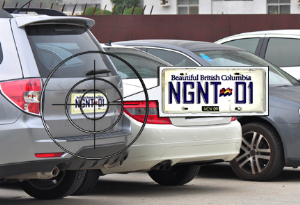
The Department of Homeland Security has scaled back the scope of contractor requirements for what would have been a nationwide license plate-scanning effort, amid continued uproar over the on-again-off-again project.
The new system, announced last month, will compile license plate records from “at least 25 states” instead of all states, DHS Immigration and Customs Enforcement officials said in a May 1 modification of the contract requirements.
More than a year ago, DHS Secretary Jeh Johnson cancelled a similar plate-tracking project after concerns were raised that plate data-searching tools essentially amounted to location-tracking technology.
ICE officials say the service is intended to help apprehend immigrant fugitives, along with individuals suspected of child pornography, illegal arms exports and other illegal activity.
Under the revised plan, the number of records supplied monthly by the contract would also decrease. The modified contract says the vendor must supply at least 6 million records per month, replacing April specifications that at least 30 million records be available.
The number of metro areas under surveillance also will be somewhat restricted. Rather than compiling plate data from 30 metro areas, the vendor will aggregate data from 24 metro areas.
License-plate recognition companies index images of plates from surveillance cameras at toll roads, parking lots and other locations across the country, in part, to help authorities track the movements of suspects.
The ICE service will scour for “known license plate numbers associated with the aliens who are immigration enforcement priorities? and track ?where and when the vehicle has traveled within a specified period of time,? government officials say.
Homeland Security maintains the service will not create a repository of license plate data, but instead create a mechanism to search separate databases maintained by private companies and government agencies.
“ICE is neither seeking to build nor contribute to any public or private” database, officials said in a solicitation for vendors issued April 17. The purpose of the contract is to provide authorities round-the-clock access to “a commercially available, query-based” license plate database for ICE law enforcement personnel.
Early in April, indications surfaced that last year?s nixed project was making a comeback, with the publication of a privacy impact assessment describing how ICE “intends to procure the services of a commercial vendor of [license plate reader] information.”
The American Civil Liberties Union and other public advocacy groups still view the service as akin to having Big Brother in the passenger seat.
“It’s appropriate to use license plate scanners to check for wanted vehicles, but the technology should never be used to store up databases of the movements of vehicles that are not on any hot lists,” ACLU senior policy analyst Jay Stanley and ACLU legal assistant Bennett Stein wrote in an April 6 blog entry. “It violates the longstanding tenet that the government not monitor citizens unless it has individualized suspicion of involvement in wrongdoing.”
Source: nextgov.com
